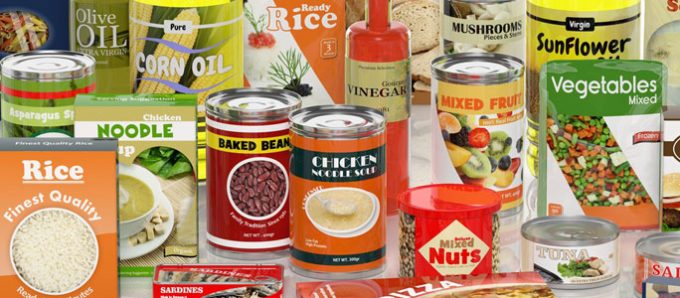The Indian Food industry has grown to become one of the largest in India, both in terms of production and consumption. While it is observing a great demand in terms of volume and value, the need of the hour is the emphasis on quality, safety, variety, and stock readiness. The industry is in fact at a nascent stage when it comes to conforming to the regulatory and quality standards, impacting the readiness and acceptance of these products in the global markets. This, coupled with the challenges of shifting consumer demands, globalization, the need for constant innovation, seasonal demands, margin squeeze, fierce competition, and more, are further restricting the growth of the Indian food industry.
In addition to these external challenges, the industry is facing internal challenges of inaccurate forecasting, slower time to market, production losses, inventory wastage , inability to meet shipment dates etc. These challenges can largely be attributed to the usage of disparate systems and spreadsheets. They lack visibility across processes plus are inaccurate in reporting and analyzing information. What’s really imperative is one comprehensive enterprise-wide tool that can support multiple departments and processes, help them work cohesively while providing the right information at the right time.
Understanding this, many Food manufacturers have started turning to an Enterprise Resource Planning (ERP) software, due to its vibrancy to automate their complete value chain while also supporting their quality and compliance needs.
In this blog post, we will talk about those indispensable reasons, why you need an ERP for your food business. We will see how having an ERP software can help you strengthen your food business by provisioning for and resolving the various issues, this industry is facing.
Food Traceability
Unarguably, traceability in the food industry is the biggest concern in the recent years. A growing number of recalls in the recent times has made it even more necessary for food manufacturers to have tools in place that allows them to both, trace and track from any level right to the root of the problem.
Few ERPs out there in the market offer Bi-directional Traceability that helps food companies track their products from receipt to issue to production and finally, shipment to the customer. Inversely, it even allows tracing from a customer to production batch in which it was produced and to the vendor from whom the material was procured. This detail-level traceability proves to a be a faster and trustworthy problem-detection operation, especially during tough times of Audits or Recalls.
Innovation in Recipes
Ever noticed that French fries in the US are prepared in beef tallow, lard, or other animal fats, while in the India subcontinent, they are prepared using the vegetable oils? The difference in the preparation methods is on account of the geographical, cultural, and other factors. And, we are currently also witnessing a time when it is more important than ever to maintain versions of recipes. Travel, on-site jobs and such, have brought about the acceptance of fusion of flavours. The consumer is demanding more, but mostly new. This only means added work for the food manufacturers: More choices, more tracking, more versions, and more innovation. An ERP can be your one-word answer for this inevitable demand of ‘more’. Complete Recipe Management, new product development accompanied by Nutritional Analysis, versioning and rollback capabilities, etc. offered by an ERP simply enable bringing new products to market faster and cheaper.
Planning and Forecast
A good plan can help take calculated risks. More so in the food manufacturing domain, because you deal with items that have a short shelf life. When you have a good plan, you will never run into ordering fewer quantities for production delays or too many quantities of the raw material to pile up in the warehouses for wastage. ERPs help create such calculated plans that align with your corporate goals. The underlying functionalities like Material Requirement Planning (MRP) and Master Production Scheduling (MPS) can help create procurement and production plans that are based on forecasts, demand, and supply.
Allergens and Reporting
Over the last decade, the awareness of actions against the food-borne illnesses and diseases has increased. And, to counter that awareness, food manufacturers must resort to proper labelling of their products. Food-based ERPs record and reproduce information on the allergen, ingredients, and nutritional facts. Labels, in their standard formats, can then be generated and printed.
We know that the food products have a very small shelf life, within which they have to reach the consumers. ERPs can also help you track the perishable items with ease. You can use the ERP to track the expiration dates for your perishable items, and then later use the reporting capabilities and printing utilities to circulate the related information to your customers, if required.
Managing Multiple Locations
Having a multi-plant utility that is based at different locations means you have to manage more than one kitchen, more than one warehouse, adhere to different laws & regulations and meet the demand that varies based on taste, preferences, and, at times, geographies. ERPs can ease off some pressure by handling inventories, requirements of raw materials, tracking of orders, generating compliance reports, and even maintaining the histories of recipes for you.
ERPs can help manage operations for multiple locations by easing material procurement, warehouse transfers, handling multiple units, promotional offers, kits, and discounts.That way, one central database stores and reproduces information pertaining to multiple locations, which gives a single, real-time and holistic picture for making quicker decisions easier.
Quality Control, cGMP and HACCP
In the last couple of decades, our lifestyle has undergone a lot of changes. We now see a new culture where we race with time and try to squeeze more and more out of the time we have. This has kicked cooking out of the window, and packaged foods have made its place in the kitchen. But, how do your customers assure they get only the quality food stuff in your shopping basket? By seeing a number of characters like HACCP Certified, FDA Approved, and such, on the packaging. Being a manufacturer, you should adhere to all the regulatory bodies to increase the chances of your products being picked by the customers. And, ERPs can help you follow Good Manufacturing Practices while also allowing applying quality checks on the raw materials and items so that only the quality-tested, safe and compliant products reach from you to the consumer.
Closing Note
There are many ERPs in the market; selecting the right one is the key. To begin with, you need to know what your business processes and organizational goals are, and what features do you need to meet them. There are a lot of advantages and long-term, profitable implications of a food ERP software. It will be a recommended thing to search on the Internet about the core capabilities of an ERP, and what of those capabilities will you like to capitalize on depending on the expectations of your business, processes and customers. The implementation of ERPs in the Food and Beverage industry is on a rise in India. And, with the advent of newer technologies, and – of course – the need for healthy food, there will sure be a lot of food manufacturers who will foresee the benefits of implementing ERPs in their businesses. After all, the idea behind food-based ERPs is simple – Improved Traceability, Improved Reporting, Improved Transparency, and Improved Profits. So, what are you waiting for? Start your search today.




















